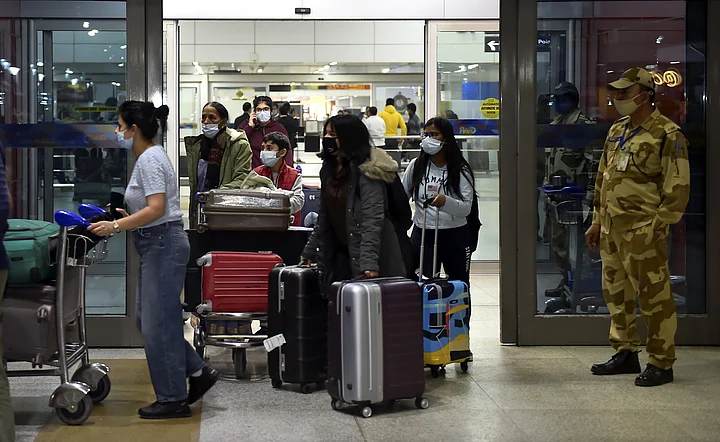Passengers travelling to India will no longer be required to fill forms or upload negative RT-PCR tests for COVID-19 on the government’s Air Suvidha portal, the Ministry of Civil Aviation said on Monday, 21 November.
The Centre is scrapping the mandate to fill up Air Suvidha forms for all international passengers. But is it safe to scrap these COVID-19 travel safety norms? What do international and domestic flight passengers need to know? The Quint answers all your questions.
What is Air Suvidha?
Air Suvidha is "a contactless solution" by the Ministry of Civil Aviation and Ministry of Health Family Welfare, facilitated by the Delhi Airport, for all international passengers travelling to India. It is, essentially, a self-declaration form for international passengers arriving in India.
The portal, which was launched in August 2020, was the means through which international passengers had to compulsorily submit details of their journey and COVID-19 vaccination or testing status.
Late in 2021, as the Omicron variant of COVID-19 spread, the Union Health Ministry made it mandatory to submit details on the portal, including passengers’ 14-day travel histories and negative RT-PCR test reports, to map if the traveler was arriving from an ‘at-risk’ country.
Since the outbreak of the COVID-19 pandemic, passengers, including children of five years and above, had to get RT-PCR tests before boarding a flight back to India.
What do the guidelines say about vaccination?
The revised guidelines say that all travelers should "preferably be fully vaccinated" as per the approved primary schedule of vaccination against the virus in their country. Though not mandatory, it is preferable.
Why is the Centre doing away with the Air Suvidha form?
The Centre has said that the present norms are being revised "in light of sustained declining COVID-19 trajectory and significant advances being made in COVID-19 vaccination coverage both globally as well as in India".
What were some of the criticisms against Air Suvidha?
Passengers complained about missing flights or having to "face harassment" at boarding points due to the Air Suvidha forms.
They also flagged issues like not being to submit the form and other technical problems. Recently, Thiruvananthapuram Congress MP Shashi Tharoor had raised the issue as well.
In October 2022, the Hospitality body, the Federation of Hotel & Restaurant Associations of India (FHRAI), had requested Civil Aviation Minister Jyotiraditya Scindia to withdraw the mandatory filling of the online Air Suvidha form for inbound travelers.
The hospitality body cited it being an impediment to the growth of Indian tourism post the pandemic.
What do the guidelines say about a passenger who is symptomatic during travel?
As per the guidelines, any passenger having symptoms of the virus during travel shall be isolated as per standard protocol i.e., the said passenger should be wearing a mask, be isolated, and segregated from other passengers while in-flight/travel and shifted to an isolation facility subsequently for follow-up treatment.
Will there still be a health check on arrival at the airport in India?
The revised norms state that "thermal screening should be done in respect of all the passengers by the health officials present at the point of entry."
If a passenger is found to be symptomatic during screening, he/she will be immediately isolated and taken to a designated medical facility.
The guidelines also state that all travelers should self-monitor their health post arrival, and should report to their nearest health facility or call the National Helpline Number or the State Helpline Number in case they have any symptoms.
A plea to do away with Air Suvidha was made around the time regular international flights resumed in March 2022 and was pursued seriously only around June, according to The Indian Express.
There reportedly was a divide within the government too over the issue of its abolition. While the aviation and tourism ministries were of the view that the requirement should be abolished, the health ministry was reluctant to do so and favoured its continuation since there was a risk of India importing new variants of COVID-19.
Requests by the tourism and aviation ministries were rejected in June, but the ministries were assured that a review would be done around August to abolish the Air Suvidha requirement.
Mid-November 2022, the government did away with the mandatory requirement of wearing face masks on board flights.
Welcoming the move, Jaison Chacko, Secretary General of FHRAI, told The Quint, "The removal of the mandatory filling of Air Suvidha forms for inbound international passengers is a welcome move from the government. Not only was filling out the online form tedious, but many travellers were completely unaware of the requirement until arriving at the airport check-in. Several passengers missed their flights to India
"There was difficulty in uploading passports and vaccination certificates on the online portal. Uploading images of passports and vaccination certificates in specified file sizes and formats for those without high-speed internet was time-consuming. The Indian tourism and hospitality industry was losing potential tourists. We had requested for the withdrawal of this mandatory requirement and we are glad that the Govt. of India considered our plea."
(With inputs from The Indian Express. )
